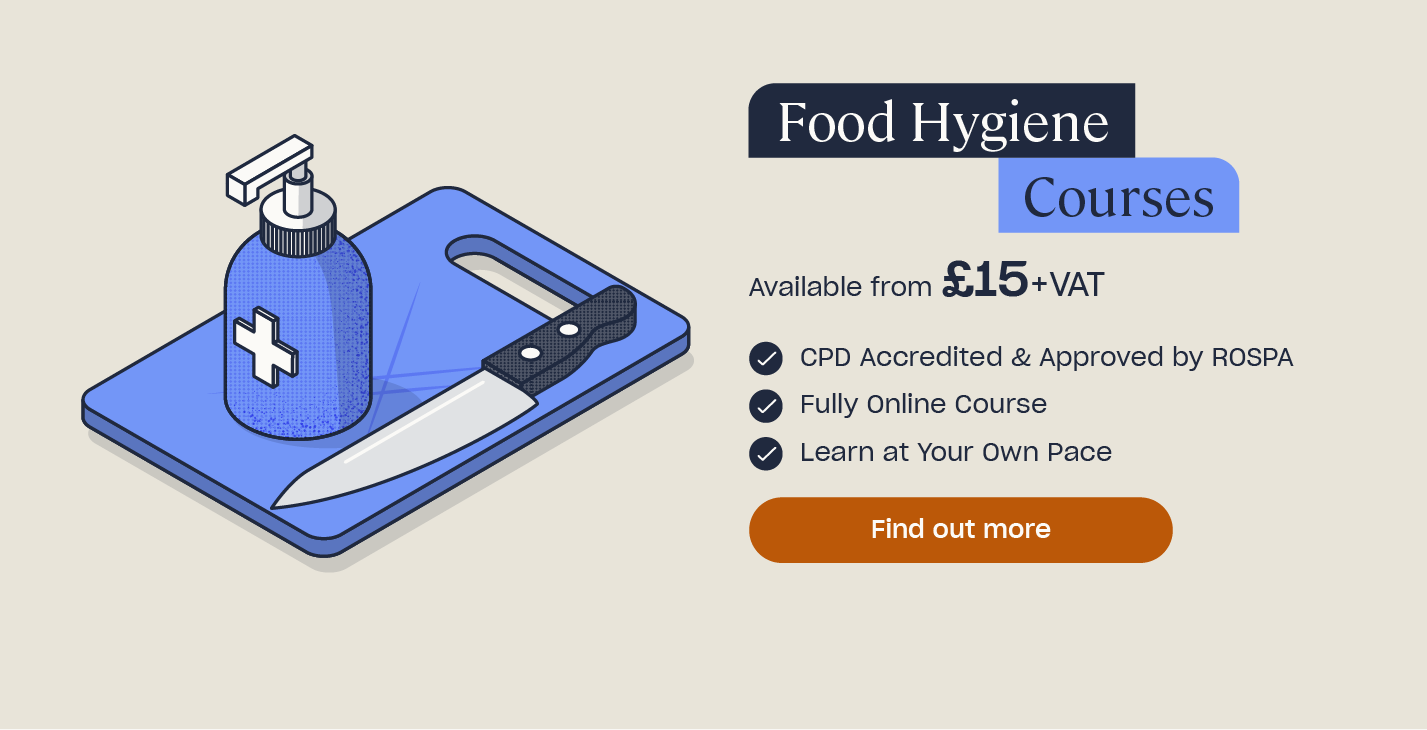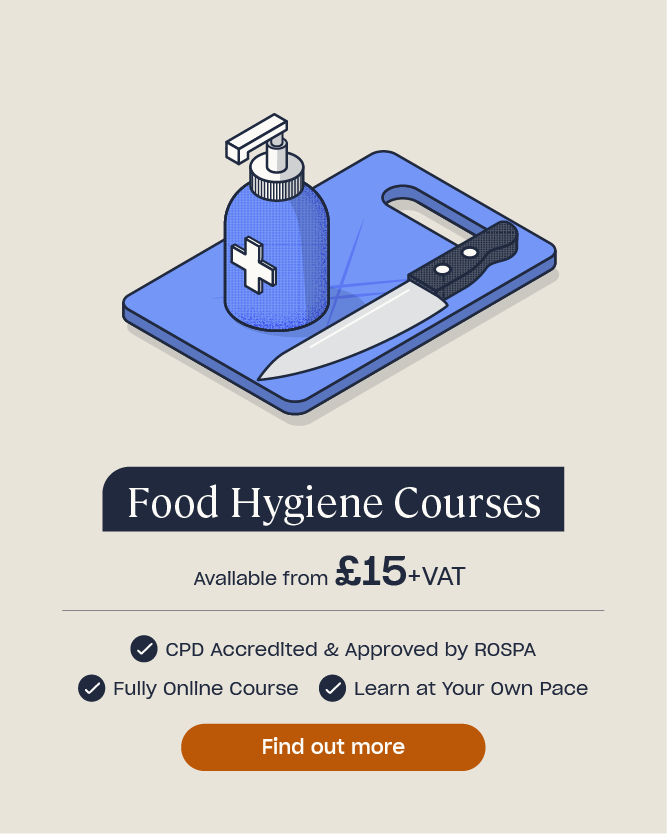Washing Food: How & Why Should We Do It?
Washing raw fruits and vegetables is something many people do before cooking or eating them, especially if they have been bought loose from the shop, or have remnants of soil on them. However, these days, preparing food at home is becoming increasingly necessary and has many of us asking – should we be washing our food, and our packaging, more frequently? This article will explain why we wash food, which food items can and can’t be washed, and how to wash food items safely.
Why is it Important to Wash Your Food Properly?
Certain food items can carry harmful bacteria on them, and so it is important to wash these to reduce the risk of you ingesting bacteria. Washing away bacteria on these items will reduce the chances of you being ill from bacteria such as E. Coli, which has previously been found on some raw salads.
It is also essential that you wash your hands before handling food or eating, and to take care when preparing food to eat. To further reduce the risk of contamination of food items, the FSA recommends that whilst food shopping, people should only handle the items they are going to purchase.
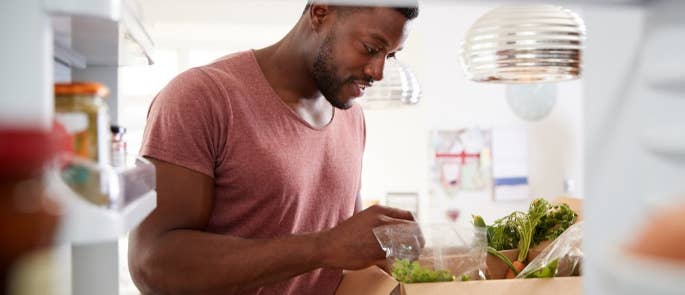
Which Foods Should You Wash?
The main foods you should wash before eating are raw fruits and vegetables, and salad items. This is because of the bacteria that may still be on them from their time growing. Bacteria can come from the soil, from birds and insects that may have landed on the produce, or even from small animals that may have been in the field where the produce grows. Food that would be peeled or cut, for example oranges, melons or avocados, should still be washed to avoid any bacteria from the outside peel ending up on the edible part. Washing foods before peeling or chopping will also prevent any bacteria from the outer side contaminating your chopping board and utensils.
If you are preparing the food for cooking, you don’t need to wash raw fruits and vegetables that look clean, as the cooking process will kill any bacteria that may be on them. In this instance, you would only need to wash them if they look dirty, to remove soil residue – no one wants boiled carrots with soil flavoured seasoning! If you are peeling soiled items, for example potatoes for roasting, you may want to wash them first to prevent soil dirt ending up on the food, or contaminating your worktop.

Another food type you should wash before cooking is shellfish. While you don’t need to wash the meat of raw fish, the shells of mussels and clams can have sand and grit on them that needs cleaning off. The best way to wash shellfish is first, run them under cold clean water for a few minutes, then fill a bowl with fresh water, place the shellfish in it and leave for another 15 minutes. You will find a layer of sediment at the bottom of the bowl. Be careful not to disturb this as you lift your shellfish out. Give them a final rinse before cooking, just to make sure you have removed all the sediment.
It’s not normally considered necessary to wash cans and tins before use. Ensuring clean and safe packaging is part of the safe production all food products must go through before they end up on our supermarket shelves. This is the reason why the FSA has declared it so unlikely that we can pick up viruses from packaging. However, if you are concerned, or if you have cans and jars that have been sitting in your cupboards for some time, you may prefer to wash the tops before opening or drinking from them.
Are There Foods You Shouldn’t Wash?
You should never wash raw meat. This is because washing raw meat in your kitchen sink will actually spread bacteria around your kitchen. Splashes of bacteria will land on every work surface, your hands, your clothes and utensils and will likely lead to greater contamination. There is no need to wash raw meat as cooking it to at least 75 °C (the recommended temperature in England, or 82 °C in Scotland) will kill any bacteria present.
Shop bought eggs also have undergone a cleaning process before they are put into cartons and sold, so they don’t require washing before use. However, if you buy eggs from a farm, or are lucky enough to have your own hens, those eggs will need cleaning before using.
Often, bagged salads will say on the packaging that they have been washed and are ready to eat. If this is the case, you do not need to wash them again. Commercial produce has usually been cleaned with food safe chemicals and rinsed several times, washing again in your home is unnecessary and may actually contaminate the product.
Another food item you should avoid washing is mushrooms. This might seem odd as even pre packaged mushrooms can have some soil on them, yet mushrooms are highly absorbent and washing them ruins their flavour and texture. As they will be cooked anyway, washing the bacteria from them is not essential. Instead, the best thing to do with mushrooms is to use a small pastry brush to brush the dirt from them.
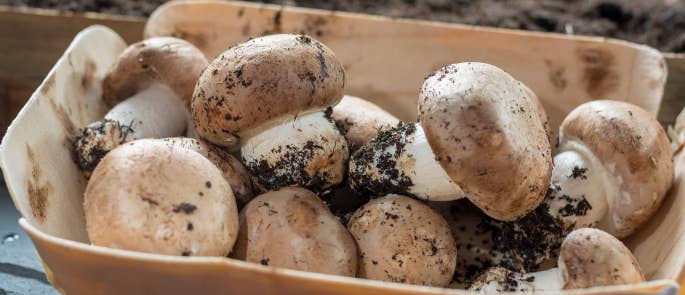
When buying food which has already been packaged you do not need to wash it when you get home as it has already undergone treatment and has been packed in a safe environment. This includes dried food in packets and food in tins. Some people do prefer to wash certain food items, such as beans canned in brine water, or uncooked rice grains, but this is a matter of taste rather than food safety.
How to Wash Food Safely
Now that you know which foods you should and shouldn’t be washing, and why, let’s look at how to do so safely.
Before handling food, remember to wash your own hands with warm soapy water. This will ensure your hands are clean and that you are not risking cross contaminating your food, worktops or any utensils you are using. To remind yourself of the correct way to wash your hands, take a look at our video here.
The best way to wash food is with cold water; place your produce in a bowl or colander under a running tap. Start with the least soiled first and rub them over under the water. When you’ve washed them all, give them a final rinse. For items with stubborn soil stains, you can use a clean brush to dislodge the dirt. For produce with lots of hiding places, such as broccoli or cauliflower, you can leave them soaking in cold clean water for a couple of minutes. Delicate items, such as raspberries, need to be handled carefully. Do not soak these but submerge them briefly in a bowl of cold clean water, and lift out gently with your hands. Loose bought items tend to have more residue on them than pre packed fruit and vegetables, but be sure to wash them all thoroughly.
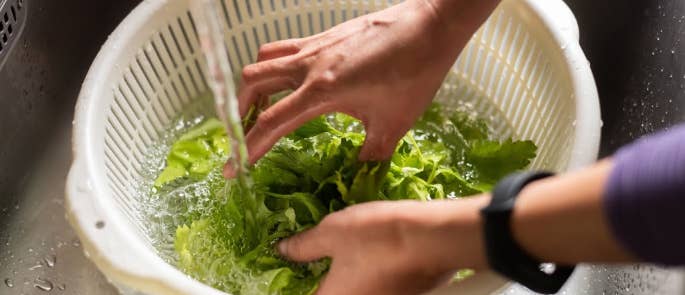
Never use soap or bacterial disinfectants to clean your food. Whilst these are good for our hands and kitchen surfaces, many foods are porous and will absorb the chemicals. This means when you come to eat the food, you ingest the chemicals also. This can make you very poorly and cause great gastrointestinal distress. Water is effective as it is in removing dirt and bacteria from food items.
This article has given you knowledge on which foods you should, or shouldn’t wash and why. It has also explained how to do so safely. It is important to remember that practicing good food hygiene in your home is the number one way to keep your food safe.
What to Read Next:
- Online Food Hygiene Training Courses
- Can I Freeze This & For How Long?
- 7 Steps of Hand Washing
- Food Safety Myths and Facts
- What Colour Chopping Board Do I Need?
- A Short Guide to Acrylamide in Food




